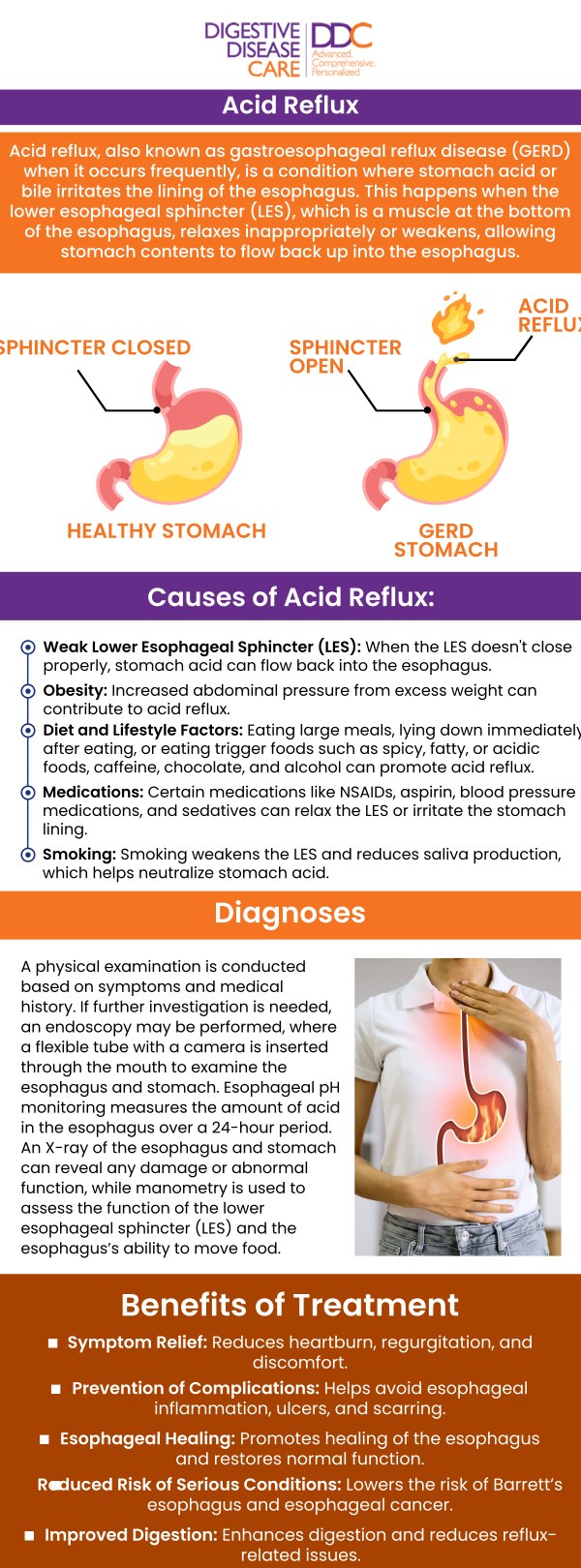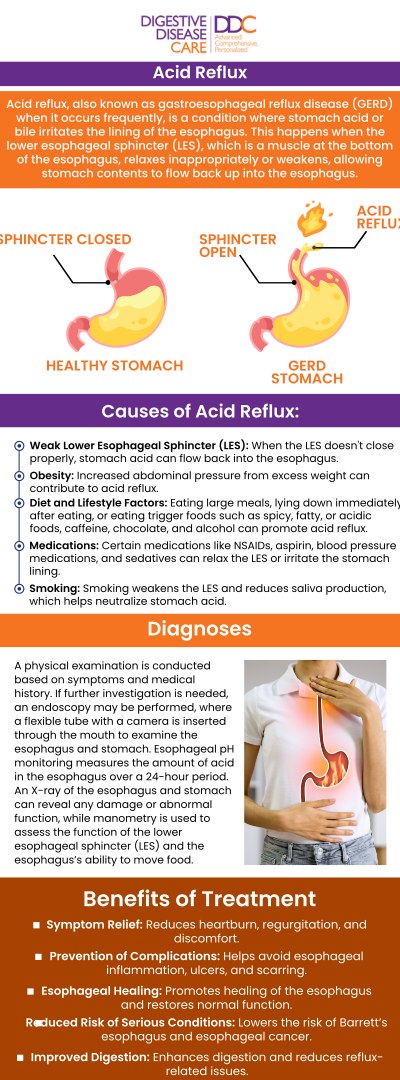Reflux Disease (GERD) Treatment in Forest Hills, NY
Reflux disease, also known as GERD (Gastroesophageal Reflux Disease), occurs when stomach acid frequently flows back into the esophagus, irritating it. Common symptoms include heartburn, regurgitation, chest pain, and difficulty swallowing. If left untreated, GERD can lead to complications like esophageal damage or narrowing. Board-certified gastroenterologists at Digestive Disease Care offer personalized treatment plans to manage GERD, improve symptoms, and prevent long-term damage. For more information, contact us today or book an appointment online. We are conveniently located at 107-40 Queens Blvd Ground Floor Forest Hills, NY 11375.


Table of Contents:
What is gastroesophageal reflux disease (GERD)?
What are the common symptoms of GERD?
What are the long-term complications of untreated GERD?
How can GERD cause chest pain?
Dr. David Sosnowik, MD’s Approach to GERD: Effective Treatment and Long-Term Solutions at Digestive Disease Care in Forest Hills NY
Gastroesophageal reflux disease (GERD) is a chronic digestive condition in which stomach acid or, occasionally, bile flows back into the esophagus. This backflow, known as acid reflux, irritates the lining of the esophagus, causing discomfort and potentially leading to more serious complications. GERD occurs when the lower esophageal sphincter (LES), the valve that normally prevents stomach contents from entering the esophagus, becomes weakened or relaxes inappropriately.
The most common symptom of GERD is heartburn, a burning sensation in the chest that often occurs after eating or while lying down. Other symptoms may include regurgitation of food or sour liquid, difficulty swallowing (dysphagia), a sensation of a lump in the throat, chronic cough, and hoarseness. In severe cases, GERD can cause damage to the esophagus, leading to conditions such as esophagitis, strictures, or even Barrett’s esophagus, which increases the risk of esophageal cancer.
Several factors contribute to the development of GERD, including obesity, pregnancy, smoking, and a diet high in fatty or acidic foods. Certain lifestyle choices, like eating large meals or lying down immediately after eating, can also trigger symptoms.
Gastroesophageal reflux disease (GERD) is a chronic condition that occurs when stomach acid or bile frequently flows back into the esophagus, causing irritation and discomfort. The symptoms of GERD can range from mild to severe and often vary depending on the individual.
Common symptoms of GERD include:
• Heartburn: The most common symptom of GERD, heartburn is a burning sensation in the chest, often after eating or when lying down. It occurs when stomach acid irritates the lining of the esophagus.
• Regurgitation: This involves the backflow of stomach contents into the mouth or throat, often accompanied by a sour or bitter taste. It can be especially noticeable when lying down or bending over.
• Chest Pain: Some people with GERD experience discomfort or pain in the chest, which can mimic the pain associated with heart conditions. This pain is often caused by acid irritating the esophagus.
• Difficulty Swallowing (Dysphagia): As GERD progresses, the esophagus may become narrowed or inflamed, making it difficult to swallow or feel like food is stuck in the throat.
• Chronic Cough or Hoarseness: Acid reflux can irritate the airways, leading to a persistent cough, throat clearing, or hoarseness, especially in the morning or after meals.
• Sore Throat or Laryngitis: The backflow of stomach acid can cause inflammation in the throat and voice box, leading to a sore throat or laryngitis.
• Nausea: Some individuals may experience nausea, particularly after meals, due to the digestive discomfort caused by GERD.
If you experience these symptoms frequently, it’s important to consult a gastroenterologist for proper diagnosis and treatment. Effective management of GERD can help prevent complications like esophagitis or Barrett’s esophagus.
Untreated gastroesophageal reflux disease (GERD) can lead to several serious and potentially debilitating long-term complications. Over time, the constant exposure of the esophagus to stomach acid can cause damage to the lining of the esophagus, leading to a variety of complications:
• Esophagitis: Chronic acid reflux can lead to inflammation of the esophagus (esophagitis), which can cause pain, difficulty swallowing, and bleeding. Severe cases can result in ulcers and further damage to the esophageal lining.
• Esophageal Strictures: Ongoing inflammation caused by GERD can lead to the formation of scar tissue, which narrows the esophagus and makes swallowing difficult. This condition, known as a stricture, may require dilation procedures to open the esophagus.
• Barrett’s Esophagus: Prolonged acid reflux can cause changes in the cells of the lower esophagus, leading to Barrett’s esophagus. This condition increases the risk of esophageal cancer, as the abnormal cell growth can become cancerous over time.
• Esophageal Ulcers: Ulcers may form in the esophagus due to ongoing damage from stomach acid. These ulcers can cause pain, bleeding, and difficulty swallowing, and may lead to infection.
• Respiratory Problems: Chronic acid reflux can lead to respiratory issues, such as asthma, chronic cough, or aspiration pneumonia. Acid can irritate the airways, triggering inflammation and breathing difficulties.
• Tooth Enamel Erosion: The acid that regurgitates into the mouth can erode tooth enamel, leading to tooth decay and dental problems.
Early treatment of GERD is essential to prevent these long-term complications. Board-certified gastroenterologists at Digestive Disease Care can help manage GERD and prevent its progression to more severe conditions.
Gastroesophageal reflux disease (GERD) can cause chest pain, a symptom often mistaken for heart-related issues. This pain occurs when stomach acid frequently flows back into the esophagus, irritating its lining. The esophagus is located near the heart, which is why the pain can sometimes feel similar to a heart attack or angina.
Here’s how GERD leads to chest pain:
• Acid Irritation: When stomach acid refluxes into the esophagus, it causes irritation and inflammation of the esophageal lining. This inflammation can lead to a burning or pressure-like sensation in the chest, commonly referred to as heartburn. The discomfort may be sharp or dull, and it can occur after eating or when lying down.
• Esophageal Spasms: GERD can cause spasms in the esophagus, leading to intense chest pain. These spasms happen when the muscles in the esophagus contract abnormally, mimicking the feeling of heart-related chest pain. Esophageal spasms may occur suddenly and can be very painful.
• Esophagitis: Inflammation of the esophagus, known as esophagitis, can develop due to ongoing acid reflux. This can lead to persistent chest pain, which may worsen when swallowing or eating.
• Acid Reflux-Induced Inflammation: Continuous exposure to stomach acid can cause the esophagus to become hypersensitive to normal sensations, making chest pain more frequent and intense even with minimal acid reflux.
While chest pain can be a common symptom of GERD, it’s important to consult a healthcare provider to differentiate it from more serious conditions, like heart disease. Dr. Preeti Mehta and our board-certified team of gastroenterologists at Digestive Disease Care can help diagnose and manage GERD-related chest pain effectively.
Dr. David Sosnowik, MD, a distinguished gastroenterologist at Digestive Disease Care, brings expertise in treating GERD with a focus on comprehensive, personalized care. Board-certified in Internal Medicine and specializing in gastroenterology, Dr. Sosnowik uses advanced diagnostic tools to accurately assess GERD severity and develop tailored treatment plans. His approach combines lifestyle modifications, dietary guidance, and medications to alleviate symptoms and prevent complications. Dr. Sosnowik is dedicated to providing long-term solutions that enhance digestive health and quality of life for patients in Forest Hills, NY.
For more information, contact us today or book an appointment online. We are conveniently located at 107-40 Queens Blvd Ground Floor Forest Hills, NY 11375. We serve patients from Forest Hills NY, Queens NY, Brooklyn NY, Elmont NY, Floral Park NY, New Hyde NY, and surrounding areas.

Check Out Our 5 Star Reviews


Additional Services You May Like

Additional Services You May Like
- Abdominal Pain
- Acid Reflux
- Barretts Esophagus
- Bloating
- Capsule Endoscopy
- Celiac Disease
- Colon Cancer Screening
- Colonoscopy
- Constipation
- Crohns Disease
- Diarrhea
- Diverticulitis
- Esophageal PH Monitoring
- Fatty Liver
- Fibroscan
- Gallstones
- Gastroenterologist
- Gastric Chest Pain
- Gluten Intolerance
- Hemorrhoid
- Hemorrhoid Banding
- Hepatitis
- Irritable Bowel Syndrome
- Lactose Intolerance
- Pancreatitis
- Polyps
- Rectal Bleeding
- Stomach
- Ulcerative Colitis
- GI Urgent Care





